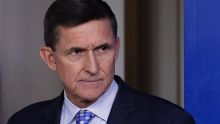Washington: Donald Trump's embattled national security adviser Michael Flynn resigned late on Monday, a dramatic early casualty in an administration hobbled by security chaos and confusion amidst a firming sense that the administration and the intelligence agencies are openly at war.
Flynn was left with nowhere to turn after being caught out – he lied to Vice President Mike Pence, insisting that he had not discussed the Obama administration's sanction on Moscow with Russia's ambassador to Washington, prompting Pence to defend him publicly. But US intelligence confirmed the lie through its eavesdropping on Flynn's phone call to the Russian embassy.
More World News Videos
Trump: Russia report a 'blot' on intel community
President-elect Donald Trump delivered his first formal press conference following the November presidential election in New York on Wednesday.
It was a bitter sweet moment in an ugly and escalating war between Flynn and the combined US intelligence agencies. Flynn, and his boss the President, have repeatedly taunted the agencies as incompetent - but on Monday they probably were patting themselves on the back for a job well done.
Always a controversial figure, Flynn survived in the job for less than a month, making him one of the shortest serving senior security officials in US history. His position became more parlous by the day – his withdrawal as a keynote speaker at a special operations forces banquet on Monday night was a strong reed in the wind after days in which Trump refused to express confidence in him.
His ignominious resignation comes amid reports that the US intelligence agencies now withhold sensitive intelligence from their presidential briefings, because this White House is not to be trusted with the nation's secrets, a follow-on from earlier inside accounts alleging that the American spy agencies had taken to advising their foreign counterparts not to share intelligence that they could not afford to have revealed by an administration that leaks like a sieve.
This latest crisis stems from revelations that ahead of the January 20 transition of power, Flynn requested, through Russian Ambassador Sergey Kislyak, that Moscow not retaliate to the Obama administration's sanctions over Russian interference in the US election.
Flynn's position was further eroded by a report on Monday, in The Washington Post, that in late January, then acting attorney general Sally Yates told the White House that by misleading Pence, Flynn had left himself open to Russian blackmail – and that the outgoing national intelligence and CIA directors had agreed with her assessment.
Trump's closest adviser, White House Chief Strategist Stephen Bannon reportedly was advising that Trump needs to "be ready" to fire Flynn. Trump was hesitant, reportedly because the foreign policy thinking of the conspiracy-driven Flynn aligned with that of the president – making Trump wary that Flynn's demise would rob him of a vocal internal supporter.

On Monday, the White House sent conflicting signals on Flynn's fate.
Spokesman Sean Spicer said that Trump was "still evaluating" the revelations on Flynn's call to the ambassador and his subsequent efforts to conceal the nature of the conversation. Working from a completely different song sheet, White House counsel Kellyanne Conway insisted during an appearance on MSNBC that Flynn "does enjoy the full confidence of the president".

Speaking after Conway, Spicer's assessment seemed portentous: "The President is evaluating the situation. He's speaking to Vice President Pence relative to the conversation the vice president had with General Flynn and also speaking to various other people about what he considers the single most important subject there is: our national security".
But despite Trump's characteristic loyalty to a true believer, Flynn's position became indefensible.

Incredibly, it didn't occur to him in denying that indeed he did discuss sanctions with the Russian ambassador, that the US intelligence agencies he so cheerfully maligns would have been listening in, and that the agencies would relish providing a transcript of the wiretap to the White House – which they reportedly have done.
Flynn was "on thin ice", according to a report early on Monday. "The knives are out," says another.

By some accounts, there is ambiguity in the transcript. But that Flynn made the call feeds a deep distrust of him in particular, and the Trump administration in general, over their as-yet unexplained close dealings with Moscow, which include a paid appearance by Flynn at a December 2015 event in Moscow, hosted by the Kremlin-funded Russia Today cable channel – at which Flynn was honoured with a seat at Russian president Vladimir Putin's dinner table.
Current and former administration officials say that the sense of Flynn's message to the ambassador was that the new sanctions were Obama's, and that American policy could change under the Trump administration – that Moscow's enemy was the Obama administration, not the US.

"[Flynn's] unpardonable sin was hanging the vice president out to dry," Republican strategist Matt Mackowiak said of the Flynn lies which became the basis of Pence's stout public defence of the NSC boss.
Flynn's struggle to survive coincides with a raft of seemingly well-sourced reports, from inside the administration and the agencies on a presidential transition wracked by unprecedented chaos and distrust and what some insiders describe as the Trump administrations casual and lackadaisical approach to security and intelligence matters.
This is best exemplified by the circumstances of Trump's security confab with Japanese Prime Minister Shinzo Abe on North Korea's weekend missile test – it took place in the middle of a bustling terrace restaurant at Trump's Mar-a-Lago resort in Florida.
Security experts are staggered there was no attempt to move to a secure setting and that, as fellow diners tweeted on the meeting and waiters came to and from Trump's candlelit table, the two leaders and the likes of Flynn and Bannon were seen poring over documents by the flashlight in their mobile phones – prompting speculation that the proximity of phones to such a meeting might have allowed foreign intelligence agencies to eavesdrop.
Notoriously insecure, Flynn's National Security Council is described as anxious and chaotic – as staff struggle to make policy sense of Trump's tweets while and at the same time, they look over their shoulders as their loyalty is questioned by an "insider threat" program that they fear includes monitoring of their mobile phones and emails for the source of multiple leaks, according to The New York Times.
In reconfiguring the NSC, Trump has increased the military staff numbers, many of they Flynn acolytes, meaning that greater emphasis is given to military solutions than to diplomatic. At the same time, the NCS standing of the military and intelligence chiefs has been downgraded and the executive order by which Trump appointed Bannon to a permanent NCS post had to be re-issued to ensure that Trump's new CIA chief, Mike Pompeo, had the same standing.
The intelligence agencies' refusal to issue a security clearance for one of Flynn's senior deputies was read in some quarters as payback for Flynn's charges that the agencies' work on Russia, in particular, was inadequate and politically motivated – but Pompeo backed the agencies' decision.
Flynn, who was sacked by the Obama administration from his job as chief of military intelligence, also has seemed out of his depth – revealing surprise on being informed that both the State Department and Congress had key roles in deciding foreign arms sales and technology transfers. Apparently he was of the belief that Trump could unilaterally agree new weapons sales to Saudi Arabia and the United Arab Emirates.
Stoking distrust even more, is a CNN report on Friday, in which intelligence sources confirmed that an ongoing investigation has now confirmed the veracity of much of the content of what has been described as the "dodgy" dossier – the explosive 35-page report by a former and respected senior British intelligence agent.
The confirmation is that conversations between foreign nationals as described in the dossier did take place – and that those involved were known to US intelligence to have been "heavily involved" in collecting information damaging to Hillary Clinton and helpful to Donald Trump.
There has been no confirmation of the salacious aspects of the dossier – in particular, that Russia had a compromising "sex tape", purportedly recorded when Trump was in Moscow in 2013.
Former NSC analyst and counterintelligence officer John Schindler writes in the Observer: "I can confirm from my friends still serving in the [intelligence community] that [the intelligence] which corroborates some of the dossier, is damning for the administration. Our spies have had enough of these shady Russian connections - and they are starting to push back."
That push back, according to Schindler, has been taken to an incredible level – "out of worries about the White House's ability to keep secrets, some of our spy agencies have begun withholding intelligence from the Oval Office.
"A senior National Security Agency official explained that NSA was systematically holding back some of the 'good stuff' from the White House. For decades, NSA has prepared special reports for the President's eyes only, containing enormously sensitive intelligence. In the last three weeks, however, NSA has ceased doing this, fearing Trump and his staff cannot keep their best [signals intelligence] secrets."
Schindler quotes a senior Pentagon intelligence official, who told him: "since January 20, we've assumed that the Kremlin has ears inside the White House Situation Room – there's not much the Russians don't know at this point,' the official added in wry frustration."
Flynn has a reputation for making dubious, ill-founded statements and for having no regard for documented facts – during his term as chief of the Defence Intelligence Agency (DIA), from which he was sacked for managerial incompetence and poor judgment, his staff coined the disparaging term "Flynn facts".
In December, Trump sacked Flynn's son from his transition team for tweeting the bogus claim that Clinton and other senior Democrats were running a child sex ring through a Washington pizzeria – but he spared the father who also tweeted such nonsense.
On Monday night, the father copped it in the neck too.


















10 comments
New User? Sign up